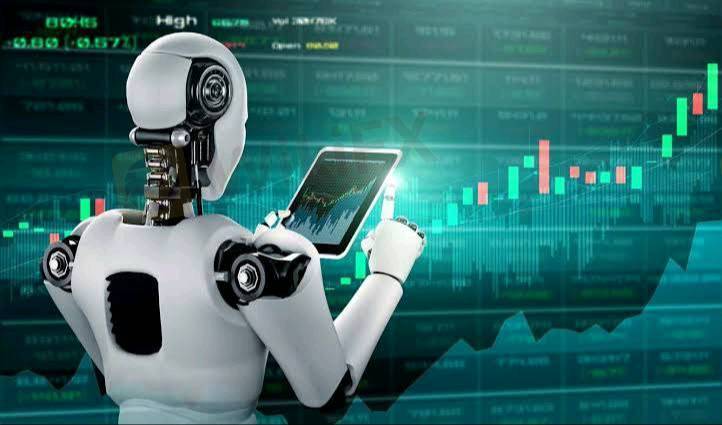
2025-03-31 12:39
In der IndustrieAl's Role in Forex MarketHigh-Frequency Market Mak
#AITradingAffectsForex
AI is playing an increasingly crucial role in high-frequency market making within the forex market. This area of trading, characterized by extremely rapid transactions, relies heavily on advanced technology, and AI is proving to be a powerful tool. Here's how AI is influencing high-frequency market making:
Understanding High-Frequency Market Making
* High-frequency market making involves providing liquidity to the forex market by continuously placing buy and sell orders.
* These market makers aim to profit from the bid-ask spread, the small difference between buying and selling prices.
* Speed is paramount, as opportunities can disappear in milliseconds.
AI's Contributions:
* Ultra-Fast Data Analysis:
* AI algorithms can analyze massive amounts of market data in real-time, far exceeding the capabilities of human traders.
* This includes analyzing order book data, price fluctuations, and news feeds.
* Optimal Order Placement:
* AI can optimize order placement strategies, determining the best prices and quantities to offer based on real-time market conditions.
* This helps market makers to maximize their profits while minimizing their risk.
* Risk Management:
* AI can assess and manage the risks associated with high-frequency trading, such as:
* Adverse price movements.
* Sudden changes in market liquidity.
* AI-driven systems can dynamically adjust trading strategies to mitigate these risks.
* Pattern Recognition:
* Machine learning algorithms can identify subtle patterns in market data that humans may miss.
* This includes detecting:
* Short-term price trends.
* Liquidity imbalances.
* Potential arbitrage opportunities.
* Adaptability:
* AI systems are able to adapt to the constant changes of the forex markets. This is a vital part of remaining profitable in the HFT arena.
Key AI Techniques:
* Machine Learning:
* Algorithms like neural networks and reinforcement learning are used to optimize trading strategies.
* Deep Learning:
* Deep learning models can analyze complex datasets and identify subtle patterns.
Impact:
* Increased Market Liquidity: High-frequency market makers, enhanced by AI, contribute to increased market liquidity.
* Reduced Bid-Ask Spreads: AI-driven market making can lead to tighter bid-ask spreads, reducing transaction costs for traders.
* Increased Market Efficiency: AI contributes to greater market efficiency by enabling faster and more accurate price discovery.
It's important to note that high-frequency trading and the use of AI within it, is a complex and sometimes controversial subject. There are on going discussions about the risks that are associated with HFT.
Gefällt 0
harden9446
Händler
Aktueller Inhalt
In der Industrie
Event-A comment a day,Keep rewards worthy up to$27
In der Industrie
Nigeria Event Giveaway-Win₦5000 Mobilephone Credit
In der Industrie
Nigeria Event Giveaway-Win ₦2500 MobilePhoneCredit
In der Industrie
South Africa Event-Come&Win 240ZAR Phone Credit
In der Industrie
Nigeria Event-Discuss Forex&Win2500NGN PhoneCredit
In der Industrie
[Nigeria Event]Discuss&win 2500 Naira Phone Credit
Kategorie

Plattform

Ausstellung

IB

Rekrutierung

EA

In der Industrie

Markt

Index
Al's Role in Forex MarketHigh-Frequency Market Mak
 Vereinigte Staaten | 2025-03-31 12:39
Vereinigte Staaten | 2025-03-31 12:39#AITradingAffectsForex
AI is playing an increasingly crucial role in high-frequency market making within the forex market. This area of trading, characterized by extremely rapid transactions, relies heavily on advanced technology, and AI is proving to be a powerful tool. Here's how AI is influencing high-frequency market making:
Understanding High-Frequency Market Making
* High-frequency market making involves providing liquidity to the forex market by continuously placing buy and sell orders.
* These market makers aim to profit from the bid-ask spread, the small difference between buying and selling prices.
* Speed is paramount, as opportunities can disappear in milliseconds.
AI's Contributions:
* Ultra-Fast Data Analysis:
* AI algorithms can analyze massive amounts of market data in real-time, far exceeding the capabilities of human traders.
* This includes analyzing order book data, price fluctuations, and news feeds.
* Optimal Order Placement:
* AI can optimize order placement strategies, determining the best prices and quantities to offer based on real-time market conditions.
* This helps market makers to maximize their profits while minimizing their risk.
* Risk Management:
* AI can assess and manage the risks associated with high-frequency trading, such as:
* Adverse price movements.
* Sudden changes in market liquidity.
* AI-driven systems can dynamically adjust trading strategies to mitigate these risks.
* Pattern Recognition:
* Machine learning algorithms can identify subtle patterns in market data that humans may miss.
* This includes detecting:
* Short-term price trends.
* Liquidity imbalances.
* Potential arbitrage opportunities.
* Adaptability:
* AI systems are able to adapt to the constant changes of the forex markets. This is a vital part of remaining profitable in the HFT arena.
Key AI Techniques:
* Machine Learning:
* Algorithms like neural networks and reinforcement learning are used to optimize trading strategies.
* Deep Learning:
* Deep learning models can analyze complex datasets and identify subtle patterns.
Impact:
* Increased Market Liquidity: High-frequency market makers, enhanced by AI, contribute to increased market liquidity.
* Reduced Bid-Ask Spreads: AI-driven market making can lead to tighter bid-ask spreads, reducing transaction costs for traders.
* Increased Market Efficiency: AI contributes to greater market efficiency by enabling faster and more accurate price discovery.
It's important to note that high-frequency trading and the use of AI within it, is a complex and sometimes controversial subject. There are on going discussions about the risks that are associated with HFT.
Gefällt 0
Ich möchte auch kommentieren
Einreichen
0Kommentare

Es gibt noch keinen Kommentar. Mach den ersten

Einreichen
Es gibt noch keinen Kommentar. Mach den ersten